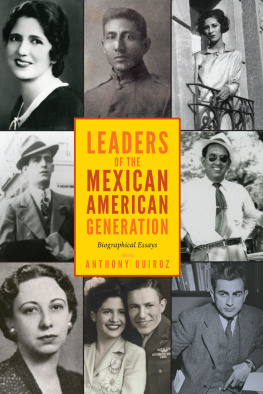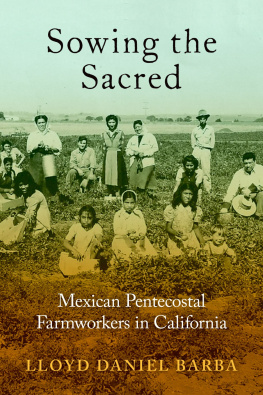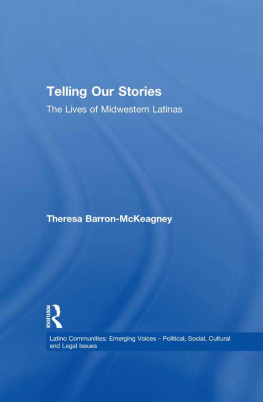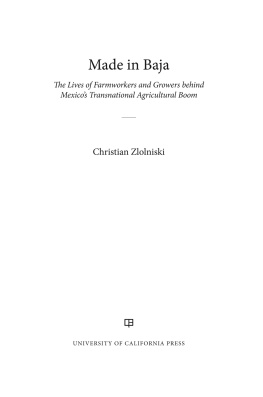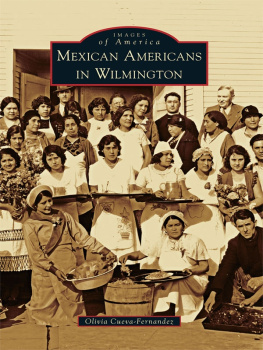Daughters and Granddaughters of Farmworkers
Families in Focus
Series Editors
Anita Ilta Garey, University of Connecticut
Naomi R. Gerstel, University of Massachusetts, Amherst
Karen V. Hansen, Brandeis University
Rosanna Hertz, Wellesley College
Margaret K. Nelson, Middlebury College
Katie L. Acosta, Amigas y Amantes: Sexually Nonconforming Latinas Negotiate Family
Anita Ilta Garey and Karen V. Hansen, eds., At the Heart of Work and Family: Engaging the Ideas of Arlie Hochschild
Mary Ann Mason, Nicholas H. Wolfinger, and Marc Goulden, Do Babies Matter? Gender and Family in the Ivory Tower
Jamie L. Mullaney and Janet Hinson Shope, Paid to Party: Working Time and Emotion in Direct Home Sales
Markella B. Rutherford, Adult Supervision Required: Private Freedom and Public Constraints for Parents and Children
Barbara Wells, Daughters and Granddaughters of Farmworkers: Emerging from the Long Shadow of Farm Labor
Daughters and Granddaughters of Farmworkers
Emerging from the Long Shadow of Farm Labor
Barbara Wells
Rutgers University Press
New Brunswick, New Jersey, and London
Library of Congress Cataloging-in-Publication Data
Wells, Barbara, 1950
Daughters and granddaughters of farmworkers : emerging from the long shadow of farm labor / Barbara Wells.
pages cm. (Families in focus)
Includes bibliographical references and index.
ISBN 9780813562858 (hardcover : alk. paper) ISBN 9780813562841 (pbk. : alk. paper) ISBN 9780813562865 (e-book)
1. Mexican American women agricultural laborersCalifornia. 2. Mexican American womenSocial conditionsCalifornia. 3. Mexican American womenSocial life and customs. I. Title.
HQ1166.W45 2013
305.8968'72073dc232013000428
A British Cataloging-in-Publication record for this book is available from the British Library.
Copyright 2013 by Barbara Wells
All rights reserved
No part of this book may be reproduced or utilized in any form or by any means, electronic or mechanical, or by any information storage and retrieval system, without written permission from the publisher. Please contact Rutgers University Press, 106 Somerset Street, New Brunswick, NJ 08901. The only exception to this prohibition is fair use as defined by U.S. copyright law.
Visit our website: http://rutgerspress.rutgers.edu
Manufactured in the United States of America
For Valentina and Maya Garcia Wells
Contents
As an Anglo graduate student in sociology, I was honored and privileged to work with a leading Latina family sociologist, Maxine Baca Zinn. I learned from her that to be a successful scholar, one must ask the right questions and be committed to the virtue of hard work. In working with Maxine, I became convinced of the explanatory power of a structural analysis that takes into account the intersection of race, social class, and gender. The honor continued as we collaborated on what is by now a well-known analysis of Latino families, Diversity within Latino Families: New Lessons for Family Social Science (2000). Beyond specific Latina/o concerns, I have been privileged to work with Maxine and D. Stanley Eitzen on a diversity-based approach to family sociology in the textbook, Diversity in Families. It is the convergence of these two themes in my intellectual developmentseeing the analytical promise of structural analysis and developing an interest in Latino familiesthat brought me to the present project.
My decision to undertake this research project was further encouraged by what I perceived to be a challenge put forward by authors of an article in a leading journal in the field of family studies, the Journal of Marriage and Family. In a review of the research on ethnic families from the 1990s, Marital Processes and Parental Socialization in Families of Color: A Decade Review of Research (2000), McLoyd and her coauthors concluded that if one had to deduce the current demographic realities of the United States from the quantity of research on Latino families, one would conclude that these families were a miniscule percentage of the population. The authors called for more and better research on Latino families. The circumstances have changed in ensuing years as more research has centered on Latino families. Much of the new research is excellent, but it has been clear that more qualitative research is needed. This book is the product of a process of thinking carefully about how I might contribute to the body of research on this important segment of the U.S. population.
My greatest thanks go to the women, daughters and granddaughters of farmworkers, who participated in my research. As I prepared to launch this project in Imperial County, I did not know whether the Latinas I hoped to interview would share their family histories and the stories of their own lives with me. A research fellowship in the summer of 2005 allowed me to explore that question. During this time, I made many community contacts and pretested my interview with Mexican American mothers who met my criteria for research participation. I found then, and in every subsequent research trip to the Imperial Valley, that local residentsboth Anglo and Mexican Americanwere entirely gracious with their time and encouraging of my work.
In concluding my interviews, I always asked the participants if they had questions for me. Sometimes women asked me for advice or asked me to tell them about Tennessee, where I work and live. But the most common question to me, an Anglo woman from someplace else, was, Why are you doing this? The subtext to their question was, Why would you care? When I told them that my goal was to help all of us in the United States better understand families like theirs, most simply said, Thank you. Some gave me a hug and a few shed a tear. As I wrote this manuscript, I have tried to honor my commitment.
Special thanks go to several Imperial County women who supported my work in ways that truly made a difference. Kimberly Collins, Director of CCBRES (California Center for Border and Regional Economic Studies) at San Diego State UniversityImperial Valley, gave me research associate status, provided an office, and helped me understand a complex research setting. Gloria Arrington, site supervisor of the Brawley One Stop, provided me with a space for conducting interviews in a private setting and patiently explained the intricacies of social service programs in California. Maria Solano and Norma Gamez also provided important assistance.
I must also acknowledge the Hernandez family of Brawley. Julian and Maria Hernandez were immigrant farmworkers who picked and packed melons. The Hernandez home continues to be the gathering place for large extended family celebrations of holidays and other hallmark events for the Hernandez, Garcia, and Duarte families and others. I first learned of the Hernandez family of Brawley and about the Imperial Valley more generally from my daughter-in-law, who is one of Julian and Marias granddaughters.
The time I have spent in field research in the Imperial Valley has been my most satisfying professional work to date. I have never failed to be fascinated by the people and the place. My time in the Valley was all the more dynamic because my husband, a historian, was at the same time working on his own research, which overlapped mine in some ways. His project, centered on religious aspects of the Latino civil rights movement in California associated with the career of Cesar Chavez, brought the lives of farmworkers to his mind as well as mine. We found in this research, as in life, that sociology and history are compatible pursuits, with perspectives that complement and support each other.


